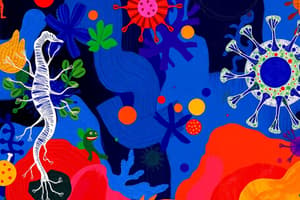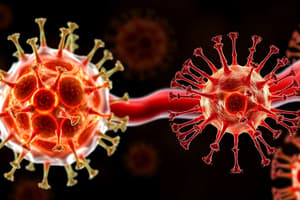Podcast
Questions and Answers
Which component of innate immunity involves the release of chemicals that enhance inflammatory responses?
Which component of innate immunity involves the release of chemicals that enhance inflammatory responses?
What is the role of memory cells in adaptive immunity?
What is the role of memory cells in adaptive immunity?
Which immune cells are primarily involved in phagocytosis?
Which immune cells are primarily involved in phagocytosis?
What is the primary function of T cells in the immune response?
What is the primary function of T cells in the immune response?
Signup and view all the answers
How do dendritic cells connect innate and adaptive immunity?
How do dendritic cells connect innate and adaptive immunity?
Signup and view all the answers
What is a primary characteristic of innate immunity?
What is a primary characteristic of innate immunity?
Signup and view all the answers
Which type of cell is primarily responsible for producing antibodies?
Which type of cell is primarily responsible for producing antibodies?
Signup and view all the answers
What is the function of natural killer (NK) cells?
What is the function of natural killer (NK) cells?
Signup and view all the answers
How do antigen-presenting cells (APCs) contribute to the immune response?
How do antigen-presenting cells (APCs) contribute to the immune response?
Signup and view all the answers
Which type of immune disorder is characterized by the immune system attacking the body's own tissues?
Which type of immune disorder is characterized by the immune system attacking the body's own tissues?
Signup and view all the answers
What role do cytokines play in the immune system?
What role do cytokines play in the immune system?
Signup and view all the answers
What is one critical lifestyle factor that helps maintain proper immune function?
What is one critical lifestyle factor that helps maintain proper immune function?
Signup and view all the answers
Which of the following statements accurately describes autoimmune diseases?
Which of the following statements accurately describes autoimmune diseases?
Signup and view all the answers
What impact can chronic stress have on the immune system?
What impact can chronic stress have on the immune system?
Signup and view all the answers
Which of the following best describes the relationship between vaccination and the immune system?
Which of the following best describes the relationship between vaccination and the immune system?
Signup and view all the answers
How does aging affect immune function?
How does aging affect immune function?
Signup and view all the answers
Study Notes
Innate Immunity
- Innate immunity is the body's first line of defense against pathogens.
- It is non-specific, meaning it responds to a wide range of pathogens without prior exposure.
- Key components include physical barriers (skin, mucous membranes), chemical barriers (enzymes, acids), and cellular components (phagocytes, natural killer cells).
- Phagocytes, such as macrophages and neutrophils, engulf and destroy pathogens through phagocytosis.
- Natural killer (NK) cells recognize and destroy infected or cancerous cells.
- Inflammation is a crucial component of innate immunity, characterized by redness, swelling, heat, and pain. It helps to isolate and destroy pathogens.
- The complement system is a group of proteins that enhance the ability of antibodies and phagocytic cells to clear pathogens.
Adaptive Immunity
- Adaptive immunity is a more specific and targeted response to pathogens, developing over time after exposure.
- It involves lymphocytes, specifically B cells and T cells.
- B cells produce antibodies, proteins that specifically bind to and neutralize pathogens.
- T cells, including helper T cells and cytotoxic T cells, directly attack infected cells.
- Memory cells are crucial in adaptive immunity, providing immunological memory.
- This leads to a faster and more effective response upon subsequent exposure to the same pathogen.
- The major histocompatibility complex (MHC) molecules are essential for presenting antigens to T cells.
Immune Cell Types
- Macrophages: Phagocytic cells that engulf and destroy pathogens; also antigen-presenting cells.
- Neutrophils: Phagocytic cells that are the most abundant type of white blood cell, crucial in the initial response to infection.
- Dendritic cells: Specialized antigen-presenting cells that link innate and adaptive immunity by presenting antigens to T cells.
- Natural Killer (NK) cells: Lymphocytes that directly kill infected or cancerous cells without prior sensitization.
- B cells: Lymphocytes that produce antibodies which neutralize pathogens.
-
T cells: Lymphocytes with diverse functions, including:
- Helper T cells: Activate B cells and other immune cells.
- Cytotoxic T cells: Directly kill infected cells.
- Mast cells: Important in allergic reactions; also release histamine.
- Eosinophils: Involved in parasitic infections and allergic reactions.
- Basophils: Release histamine, implicated in allergic reactions.
Immune System Interactions
- Innate and adaptive immunity work together in a coordinated fashion.
- Antigen-presenting cells (APCs), such as macrophages and dendritic cells, process and present antigens to T cells.
- This interaction initiates the adaptive immune response.
- Cytokines are signaling molecules produced by immune cells that help regulate and coordinate the immune response.
- These molecules mediate communication between different immune cell types.
Immune System Disorders
- Immunodeficiency disorders: A weakened immune system with an increased susceptibility to infections.
- Autoimmune disorders: Immune system mistakenly attacks the body's own tissues.
- Hypersensitivity reactions: Exaggerated immune responses to harmless substances (allergies).
- Allergies: A type of hypersensitivity reaction involving IgE antibodies and mast cells.
- Autoimmunity: The immune system attacking healthy tissues. Examples include rheumatoid arthritis, lupus, and multiple sclerosis.
Immune System Function and Maintenance
- The immune system is constantly working to protect the body against various threats.
- A healthy diet, sufficient sleep, and stress management are essential for maintaining proper immune function.
- Regular exercise has a positive effect on the immune system.
- Vaccination has been very successful in controlling infectious diseases.
- Vaccines stimulate the adaptive immune response, producing memory cells that provide long-lasting protection.
- The immune system adapts over time based on encounters with infectious agents.
Factors Affecting Immune Function
- Age: Immune function changes throughout a person's life.
- Nutrition: Deficiencies may negatively impact the immune response.
- Genetics: Individuals' genetic makeup influence their immune responses, susceptibility to infections, and autoimmunity.
- Stress: Chronic stress can impair immune function.
- Medications: Some medications can suppress immune responses.
- Environmental factors: Exposure to environmental toxins and pollutants can influence immune system activity.
Studying That Suits You
Use AI to generate personalized quizzes and flashcards to suit your learning preferences.
Description
This quiz explores the key concepts of innate and adaptive immunity, highlighting their distinct roles in the immune response. Key topics include the components of innate immunity, such as physical and chemical barriers, as well as the specific functions of the adaptive immune system. Test your knowledge on how these two systems work together to protect the body from pathogens.




